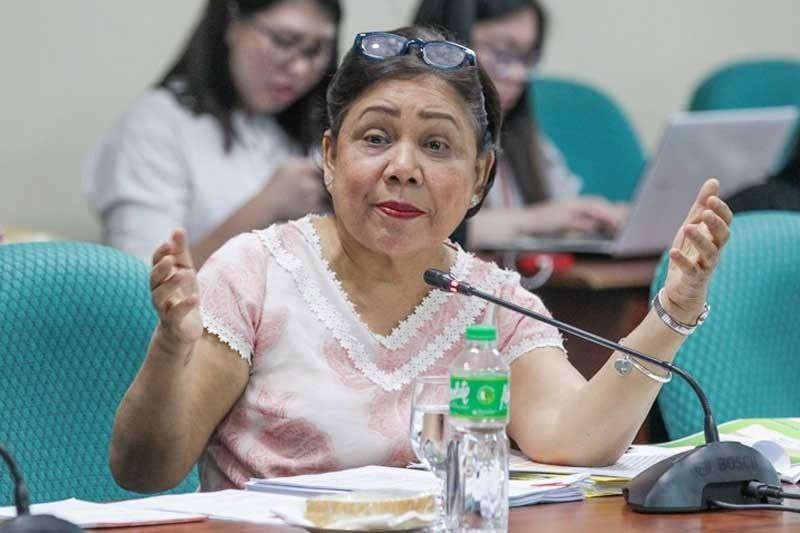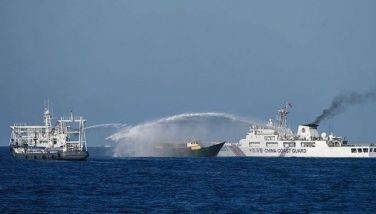Let labor-intensive sectors reopen – Villar

MANILA, Philippines — Workers from the agriculture, construction and manufacturing sectors should be allowed to return to work to prevent widespread hunger, social unrest and criminality that may be triggered by the prolonged enhanced community quarantine (ECQ) in Luzon and other parts of the country, Sen. Cynthia Villar said yesterday.
Villar, who chairs the Senate committee on agriculture and food, expressed concern that the extended ECQ meant to contain the spread of the coronavirus disease 2019 (COVID-19) was already taking its toll on the employment situation of the poor.
She said the government must implement “more realistic and sustainable measures should be put in place” to make it easier for the economy to recover once the lockdown is lifted.
The senator recommended the opening of labor intensive sectors such as agriculture, manufacturing and construction for the poor and lower middle class.
She noted that the agriculture sector is in full swing, but some allied industries have limited operations or have ceased operations, displacing food manufacturing workers and limiting the supply of food in the market.
“With the extension of the ECQ for another half month, we need to intensify food production as well as ensure the unimpeded flow of fresh produce and food products all over the country,” Villar said, citing media reports that those employed in the construction and manufacturing sectors are adversely affected.
With work stoppage due to the lockdown, many workers are not only stranded in their workplaces, but also without any income, according to the senator.
“As we all know, workers in construction and manufacturing are daily wage earners who are compensated on a ‘no work, no pay’ basis. They have no source of income while on ECQ. While the government and companies may have extended financial assistance and relief goods, those will not be enough,” Villar said.
She warned that people are already going hungry, and if not addressed immediately, people may resort to crime to be able to eat.
“Many are willing to risk their lives and get infected with the coronavirus, just to provide food for their family. They can be heard saying that on TV and in social media,” the senator said.
Agriculture comprises 22 percent of workers in the country, 10 percent are in manufacturing and 10 percent are in construction, she said, citing government data.
Construction workers numbered 3.9 million in 2018 and manufacturing had almost the same number.
Villar said the ECQ should not only be dependent on areas but also in industry types or sectors.
“We should remember that 70 percent of the gross domestic product of the Philippines is in the National Capital Region, Calabarzon and Central Luzon. And if we do not practice partial lockdown in these areas, we lose 70 percent of our gross domestic product,“ she said.
While there may be health risks, workers who will be allowed to work will still have to follow government-implemented health and safety protocols such as social distancing and wearing of face masks, according to Villar.
The employers can also make sure that they comply with the guidelines. They can even provide shuttle services to their employees.
Villar said it is also good timing that it is already dry season in the country, and studies have confirmed that the coronavirus dies more quickly in hot and humid weather.
She cited experiments carried out by the United States National Biodefense Analysis and Countermeasures Center, showing that the coronavirus cannot survive in high temperatures and humidity. Reports have said the ultraviolet rays can also kill the virus both on surfaces and in air.
“Agricultural and construction workers work outdoors in open spaces and are exposed to sunlight, so the risks of them getting infected are much lower, as long as the people practice personal protection measures,” Villar said.
Mass testing for workers
Meanwhile, a senior administration lawmaker yesterday urged the Inter-Agency Task Force (IATF) on Emerging Infectious Diseases to set guidelines for people returning to work in areas where the enhanced community quarantine will be lifted on May 15.
“Mass testing of workers is a must to ensure the safety of everyone and to prevent a resurgence of COVID-19 in areas that will no longer be covered by the ECQ,” Bagong Henerasyon party-list Rep. Bernadette Herrera said.
Herrera, House deputy majority leader, added that the guidelines must include requiring private companies and local government units (LGUs) to have their employees undergo rapid testing for COVID-19, stressing that it is “the only way to get back to a semblance of normalcy.”
The government may consider offering tax credit or any incentive to private firms to offset the cost of mass testing, according to the congresswoman. This is to make sure that the same will not be passed on to consumers and that such requirement will not result in higher inflation rate.
Herrera said only those who test negative for the virus will be allowed to return to work, while those who are positive must be brought immediately to hospitals or quarantine facilities set up by the LGUs.
“LGUs must put in place a system or protocol, especially in transporting workers who will test positive for COVID-19 to hospitals or quarantine facilities, depending on the gravity or weakness of the symptoms,” she said.
“Those who have symptoms such as fever, cough, colds and sore throat should not be allowed to return to work even if their test was negative,” she added.
To ensure that the testing requirement will not cause additional burden to consumers and businesses already bearing the brunt of the worst public health crisis of this generation, the government can offer private firms tax incentives, according to Herrera. This should correspond to the cost of having all their employees tested for COVID-19.
“The IATF may coordinate with the Department of Finance and the Department of Trade and Industry on how the government can help private companies comply with the testing requirement,” she said.
“It can be in the form of tax credit or allowing companies to declare the cost of the testing as deductible expenses that can be subtracted from their income before it is subject to taxation,” she added.
At the same time, Herrera urged the IATF to require private companies and LGUs to disinfect their workplaces daily and prepare sufficient protective supplies for their employees.
“Disinfection must be done on a daily basis and employees returning to work must be provided with appropriate protective equipment, particularly face mask and face shield, and ensure that they have spaces at least two meters apart,” she said.
The party-list lawmaker added that social or physical distancing should be observed at all times, especially in crowded places like malls, and must be accepted as the “new normal.” – With Delon Porcalla
- Latest
- Trending






























